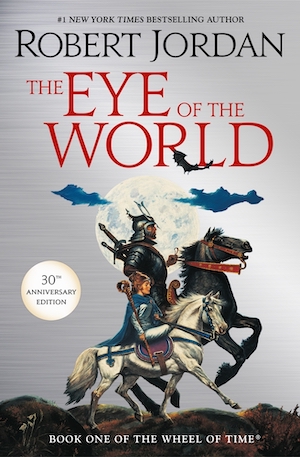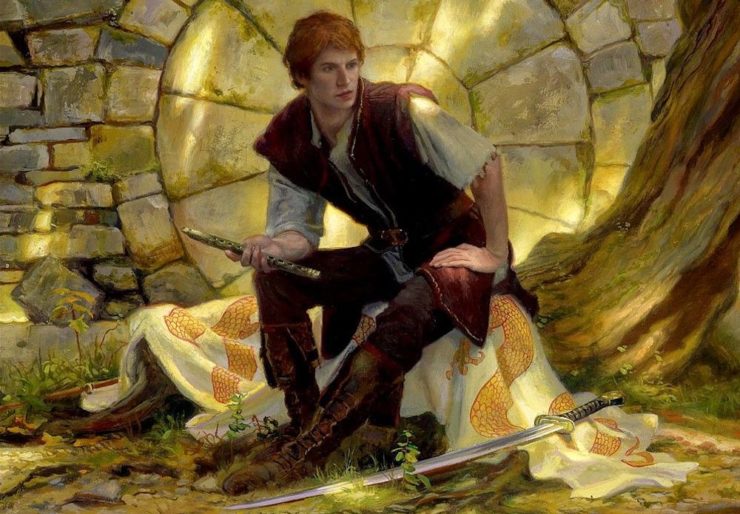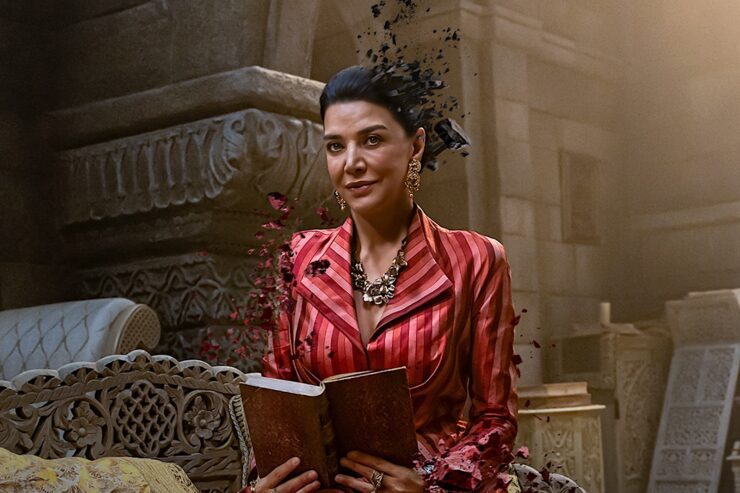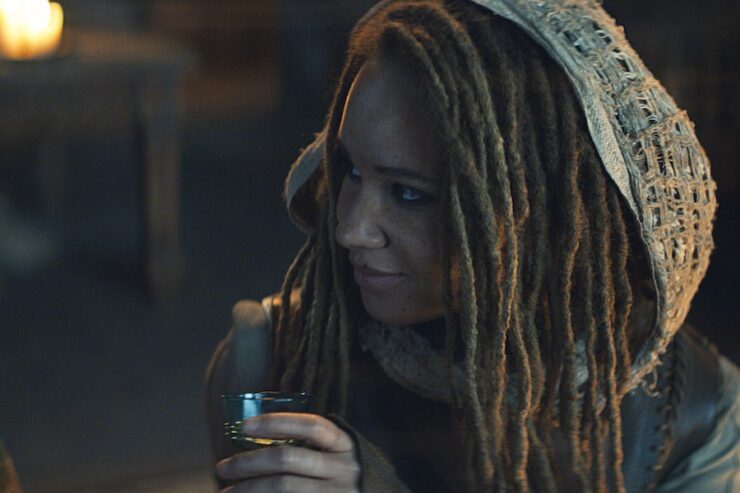Perhaps one of my favorite aspects of reading The Wheel of Time is how often I find myself in characters when I’m not expecting to. I am accustomed to seeing my weird self reflected in robots and fairies, aliens and outcast knights, because these categories are often used as analogies for othered and marginalized people—and I belong to a few of those groups. When it comes to Robert Jordan’s work, however (and I realize that I am generalizing here), his characters feel a bit more literary than genre to me, despite their setting and the magical things that they can do. As a result, I don’t look for the tropes the way I might in other fantasy works, and moments of connection sneak up on me in different ways.
A few weeks ago while reading Chapter 49 of Lord of Chaos, a specific moment for Rand struck me, and it really changed how I felt about an entire aspect of his journey.
Lews Therin has been steadily solidifying as a presence in Rand’s mind, so much so that he’s tried to argue a few times about whose body it is, and has even tried several times to seize saidin. Rand has had to devote a significant amount of energy to restraining himself from reaching for it, lest Lews Therin take control. Then, when Min reports to Rand that there are now thirteen Aes Sedai in Caemlyn, Lews Therin fully panics.
Buy the Book


The Eye of the World: Book One of The Wheel of Time
“Thirteen,” Rand said flatly, and just saying it was enough for Lews Therin to try seizing control of saidin from him again. It was a wordless struggle with a snarling beast. When Min first said there actually were thirteen Aes Sedai in Caemlyn, Rand had barely managed to seize the Power before Lews Therin could. Sweat rolled down Rand’s face; there were dark patches on his coat. He only had room for concentrating on one thing. Keeping saidin away from Lews Therin. A muscle in his cheek jumped from the strain. His right hand trembled.
This is an invisible battle for Rand—no one knows that Lews Therin is his head, nevermind that he might possibly be able to affect or control Rand’s actions. When Rand later collapses from the effort of fighting Lews Therin for so long and has to be carried to bed, nobody knows what has really happened to him.
Taint madness isn’t really analogous to real world mental health issues. The symptoms—anger, violence, destruction, and an inability to recognize reality—are associated with certain presentations of psychosis, but there is not enough detail in the description of what happened to Lews Therin and the Hundred Companions to elevate their insanity past the general stereotype of how popular culture depicts most types of mental disorders and neurodivergent conditions. But in Rand’s experiences we have much more specificity, and it is here that many people with mental illness or disabilities can actually find a lot of things that they may relate to.
Take, for example, the stigma around the taint. The very fact that he has been touched by the Dark One in this way means that everyone is always anxious around Rand. The taint only directly affects those who reach through it to wield the male half of the One Power, but when Egwene realizes that Rand has made her invisible by wrapping her in flows of saidin she is alarmed and unsettled—she feels as though, should the weave touch her at all, the taint will as well. As a channeler herself, Egwene knows that there is a difference between physical touch and metaphysical touch, but the anxiety is still there.
The moment was a stark reminder for me of how Rand’s friends treated him when they first learned that he had the ability to channel. It wasn’t just the knowledge that he would eventually become dangerous to others that caused everyone to keep their distance and made Mat openly hostile. It was the awareness that the taint, the corruption of the Dark One himself, would be lingering around Rand before he showed any symptoms of it. Even men who have been gentled, who can no longer touch saidin or the taint, are ostracized and vilified by others for this perceived corruption, as we saw with Thom’s nephew Owyn.
In our world, the stigma around mental illness often includes a fear of contamination. Mental disorders can sometimes have a genetic component, but they aren’t contagious, and yet people with these conditions are often shunned as though their tics and other symptoms might be catching. We often ascribe a moral component to mental illness as well—there are many who believe that the person must have done something to deserve their condition. That they must be bad, or lazy, or unclean. We even stigmatize neurodiversity as being something inherently bad—yet while many aspects of neurodivergent conditions do cause distress for those who have them, many are not “bad” or undesirable so much as they are different and unaccommodated.
Rand experienced a lot of pain when he first started being shunned this way, and it’s the first real consequence he experienced upon learning of his true identity. I feel this pain very acutely, relating to it not only as someone who is neurodivergent but also as a queer person. Of course, queerness isn’t a mental illness, but many people believe it to be, and queerphobes often express a fear of being exposed to queerness lest they “catch” transness or are somehow “turned” gay. They punish queer people for this, yet someone’s sexual and gender identities don’t have anything to do with anyone else’s. Just as the taint touching Rand when he channels has nothing to do with those who cannot wield saidin.
I also suffer from anxiety, which sometimes does feel like another person in my head. This person whispers bad advice into my mind, sees problems where there are none, and loves to encourage me to preempt the threats it sees all around me. My anxiety person mostly urges avoidance, but it’s not that big a leap to imagine it taking a different tack and urging a strike instead. Lews Therin might not be real, at least in any conventional sense of the word, but anxieties come from a real place—he sees betrayal in Taim because he was betrayed by his allies, he fears larger numbers of female Aes Sedai because he know that their ability to link means that they can overpower him if they choose. Lews Therin is a war veteran, and his PTSD is showing. And while I don’t have PTSD, I do have trauma in my life, and I know how it can warp your perspective and dominate your thinking.
But Rand’s collapse reminded me most of all of my experience of depression. Depression is exhausting, and though it feels less like a person for me than anxiety does, it is the thing that I feel like I am fighting an invisible battle against. Depression makes it difficult to do anything, to feel motivated, to see possibilities, to see a point to things. On a bad depression day, the basic acts of life—work, errands, cooking dinner, even brushing your teeth—seem like herculean tasks. All your energy throughout the day is sapped away as you hold the symptoms of depression at bay, and I have definitely had moments like the one Rand had at the end of Chapter 49. I know what it’s like to collapse, exhausted, at the end of the day, even though an outside observer would see little evidence of what tired me out so much.
It is only after reading this moment that I recontextualized the other instances where we saw Rand struggle with Lews Therin. But suddenly this extreme, fantastical version of mental illness seemed so much more approachable, so much more relatable. Even Lews Therin’s experience did, when I went back and reread the Prologue of The Eye of the World. In it, we meet a Lews Therin who is still under the influence of what the taint has done to his mind, but who is no longer experiencing violence or anger. The taint’s effects now seem to be a dissociation from reality and sudden mirth—a fairly standard and generic picture of “madness” in pop culture. There is a moment, however, after Elan Morin arrives, where some part of Lews Therin seems to have a moment of lucidity.
“Betrayer of Hope.” It was a whisper from Lews Therin. Memory stirred, but he turned his head, shying away from it.
This moment, in contrast with the other symptoms Lews Therin displays, is almost an afterthought, and I found myself wondering if this was the madness of the taint, or a moment where Lews Therin’s own mind deliberately avoided recognizing the truth in front of him. Because this is a real and common reaction to trauma—denial and dissociation are methods the brain employs to protect us, which can be useful in certain short-lived circumstances. Rereading, I found that I related to that moment, found that I was remembering times in my own life when I avoided seeing a painful truth. I often judge myself for those moments of denial, but I found grace for myself, and for Lews Therin, as his mind shied away from a truth that would ultimately, when faced, lead to his suicide. Having experienced suicide ideation in my own past, I felt a sort of camaraderie with Lews Therin and with Rand, despite the fact that their specific trauma is exaggerated and fantastical in nature.
Ultimately, the taint is Evil-capital-E, as it comes from the Dark One himself, which can make it a poor metaphor for real-world mental health issues, just as Balthamel’s reincarnation as Aran’gar is no metaphor for being transgender. However, much of what Rand experiences as his mind is corrupted by the taint is relatable to those who have experienced symptoms—and stigmas—of mental illness and disability. This particular one has affected me in a profound way.
As a longtime fan of epic fantasy, Sylas K Barrett is always happy to discover new ways of experiencing and relating to fantastical, otherworldly characters.















Thank you for writing this. I don’t know if it is your intention but I see openness like you showed here an important step towards destigmatizing mental illnesses.
One thing I want to point out is that when reading the wheel of time is that the strict third person viewpoint will put a flavour on every event in the text. I’ve seen other wheel of time readers curse RJ for some way that trauma or mental illness is presented and I really hold to the view that RJ knew exactly what he was doing when presenting us a world as awful as this. Rand isn’t just shunned by everyone around him, he’s also doing it to himself. Just because he has an inside look doesn’t give him a way to escape his culture’s view on himself.
If you want to look deeper into RJ’s experiences his blog could be helpful. Here’s one where he tells a story about how gained the nickname “The Iceman” in the Vietnam war: https://dragonmount.com/blogs/entry/375-hi-there/ .
I always enjoy these side quest essays by Sylas. Since I identify with Rand and his weaknesses and struggles the most, it is it is inevitably interesting (for better or worse) to hear what other people have to say about him. It was nice to hear someone talk about empathizing with Rand in a way that I do as well.
I can’t quite remember the details of the conclusion of this arc; I’m a little fuzzy. Was the voice and statements of Lews Therin in his head always only taint-induced “madness,” or was it ever actually Lews Therin and his memories (Rand’s previous life) being accessed by Rand’s brain? I don’t know if the question makes sense.
I often think of Lews Therin in terms of Robert Jordan’s tours in Vietnam. Rnad has a voice in his head… and that voice has PTSD of doing some of the most horrific things imaginable. So Rand is dealing not only with his own anxiety, but also those of Lews Therin. And Rand takes a bunch of different approaches. Sometimes he yells at Lews. Or ignores him. Or dismisses him as “crazy”. Mentally shoves him into a dark corner and tries to forget about him. Many of those responses are how Vietnam vets with PTSD were treated. I have to imagine Jordan knew some of those vets. They were my parents’ generation, but just among their friend group, I knew a couple. So that war veteran angle you mention is probably spot on.
And it takes Rand a while to find the “solution”. Which I won’t spoil.
@@@@@ 2. summerhill:
I can’t quite remember the details of the conclusion of this arc; I’m a little fuzzy. Was the voice and statements of Lews Therin in his head always only taint-induced “madness,” or was it ever actually Lews Therin and his memories (Rand’s previous life) being accessed by Rand’s brain? I don’t know if the question makes sense.
That one becomes clear at the end of The Gathering Storm, combined with the start of The Towers of Midnight. But I won’t spoil further :)
Unpredictability – or rather the fear of it – is, I believe, the source of tension, stress, and resulting “stigmatization” of those perceived as mentally unstable – and I think it is also the source of much racism, xenophobia, homophobia, etc.
Rand is a perfect example of this. Once he is known to be a male channeler, even those who were previously his close friends are suddenly unsure of what he will do and how he will react. Whereas before they had confidence in their knowing “who he was,” now he is unpredictable – an unknown quantity. Not everyone feels threatened to the same degree, of course. Min seems at ease with Rand in spite of his status as the Dragon.
I think most folks depend on believing that they can predict the actions of others – that they know what motivates them, what might stimulate their anger, what would reassure them, etc. When dealing with an unknown quantity, the stress and resulting discomfort often leads to avoidance.
@2
Spoilers Knife of Dreams Chapter 27
I think it’s important to remember that Jordan was willing to initiate these conversations in the 1990s, even if his ideas don’t hold up to present-day understanding. Like most writers, the way his characters speak and think is reflective of attitudes at the time.
Rand was always the character I related to the most, with his wounds that never heal, and the weight of responsibility. The mental illness and the pain he ensures that cause delver’s to recoil and wonder how he can even still function, while he shrugs and says he can because he has to. I feel that in my soul.
Thank you for openness on this topic!
I can just say I relate quite a bit to how you experience both anxiety and depression. I also have some neurodivergent traits (I haven’t been formally diagnosed although I share the traits with some in my family who have been) and I definitely can see the difference between the things I would ‘cure’ and those that are just…different.
I was a big classic rock junkie in high school which is when I was reading these books, and the Pink Floyd song Brain Damage (perhaps not the most sensitive title) always seemed to me to be Rand’s theme here.
Whether or not Rand is perfectly sane (and frankly, he’s dealing with so much it would make perfect sense for him not to be), Lews Therin (in this manifestation) definitely is not. But I am always glad to see somebody show a little empathy for Rand.
The lunatic is in my head
The lunatic is in my head
You raise the blade, you make the change
You rearrange me ’til I’m sane
You lock the door and throw away the key
And there’s someone in my head, but it’s not me
Thank you for this insightful analysis from Sylas and the other commenters.
I started WoT when it was first being published and got through the first five books. Life got in the way, and it was only this year I was able to travel the rest of the journey with Rand et al. I know it can take several readings of a book to be able to perceive and articulate the subtexts and real-life analogies (even those unintended by the author), but I’m astounded that I missed so much of what Sylas described here.
I know that I marveled at and was encouraged by Rand’s fortitude and determination to press on regardless of his internal struggles, but never went far enough to make the direct connection to my own struggles. So, thank you, Sylas, for giving me the context that will make my next read-through more profound.
@@.-@ and @6
Thank you for your replies to my question!
Hello Friends! No post today, sorry about that. I am on vacation! Foolishly I thought I would do work while I was on vacation, but my body and brain have informed me that this is not the case. So I will sleep and take it easy, and wish that Rand would get to do the same. Hope you all get some relaxation as well, and I can’t wait for next week’s post. Take care!
Enjoy your vacation, Sylas :)
A very thoughtful post. I think people underestimate the true struggle Rand had dealing with the weights put on his shoulders. I say weights, because he had many. Many more than the next most poignant arcs in the books.
First and foremost is the weight of his Duty, which he took much more seriously than any gave him credit for. Min knew and Lan. Cadsuane and Moraine made great mistakes with him in this regard. His Duty is what carried him through as well as knowing that there was no one else he could hand responsibility off to. No one could do it for him, so he owned it quite early on in the story. Without Lan early on would he have known to Stand no matter what? Many of his peers took this as some sort of arrogance when in reality he was simply making sure that the Duty was done on his terms and no others and that his sacrifice would be respected. It is a terrible thing, the story of the Cyclops. To know the moment of your death. Yet you don’t know how you get there. It is there, the getting there, that Rand sought to show his quality. That must have been terribly hard and depressing. To exist without hope for yourself? Taishar Dragon Reborn. The true Aes Sedai, the true Asha’man. To Serve as Guardian of All. The ultimate selflessness, yet born from duty, because there is NO ONE ELSE!!! The mindfuck of that. That should crush most everybody under it’s weight.
But those struggles he had along the way, constantly fighting literally everyone for his due, for his respect of doing his duty and doing so, quite frankly, better than any of his peers would have done. Can you imagine Egwene or Perrin or worse Mat as the Dragon Reborn? Those opening days would have broken all of them during that first year. And they were all so biddable, well.. except for Mat. Nynaeve’s Stubbornness would have helped, but she was too rash, too quick to assume and she was so anti, if you know what I mean.
Next is the Madness. Lews Therin was batshit crazy! To have to deal with that every effing day? We never even saw even a tenth of it. That struggle with LT in of itself is just… insane! And he existed like that all alone. Nobody knew! Not even Min, not until much later. And the knowing of what it meant. That he, Rand, was already Mad. That’s not even the realization of what he is, The Dragon Reborn, being just a mad revelation to begin with! Breaking the World to Remake it. All the prophecies half of which you don’t even realize you fulfilled or even worse- know that you have to fulfill them and even worse than that- the text of the prophecy doesn’t exactly match the reality of how the fulfillment happens as far as what the prophecies mean when read. Arghhhh! That’s maddening enough without a literal real person talking in your head and then fighting that same person for control? Of your own body? Every Day? Fawwww! Egwene had a better Arc? Egwene accomplishments meant more because she wasn’t Ta’veren? You are out of your mind. Hehe!
And then there’s the enemy, The Adversary and All of his minions. Some of whom know you better than you know yourself. Some of whom have been starting machinations to destroy you long LONG before your were even born. Possibly thousands of years. The corruption of the Seanchan Prophecy. The infiltration of the White Tower, the enslaving of Power users, the thousands of years of breeding an army to overwhelm any you can put together. The literal hunting you to either kill you or turn you, Before you were even Born and continuously afterwards all the way up to and including the Last Battle which you don’t even know how to fight until you get there. That not even considering what everyone else thinks you should do. That’s not even considering what others, very Powerful people and entities, have plans for you to do. And we speak not yet of the taint.
The Taint. Yep. The source of your madness, a sickness until the end without cure. A disease that makes you one of the most dangerous people in the world. That will make you go mad, will make your health your entire body slowly fail and rot and die a death that will surely kill anyone near you as well as you. Rand’s fight against the Taint was Heroic in its own right. The fact that he Cleansed is the single most underrated act in the entire book. Nothing else come close. As it saved himself and allowed him to continue on without which he most certainly would have Lost his battle on the Dragonmount. It also saved countless others, whether the disease itself stopping it’s destruction of the channeler or just stopping the progression of a ever growing madness within it was the first Great victory the side of the Light had and many had no idea it occurred. Talk about forcing. If he wasn’t at his peak strength then he was after that. So was Nynaeve for that matter. That almost killed her as well as himself. To even attempt it was madness. To endure the Oceans of Taint flowing through him like a high speed freightliner just basically trying to obliterate your mere existence away, Nynaeve didn’t have to do that. She just had to hold on to the light, Rand had to swim through Darkness itself at the same time.
PTSD? There needs to be a new word for what Rand went through. And he Won and he walked away. All without hope for Himself. He knew he was going to die…. And He Did! And still walked away. But do you ever really walk away from all of that? I think not.
-Z
aka BaleScream
Was my comment deleted?
@15 – When you edit comments in a moderated thread, they get put back in the moderation queue.
16. Moderator Ohhh. Huh. I go back and edit my posts a little when I have time. I didn’t know Tor did that now. Interesting. It’s been a while since a I was regular on Tor.com.